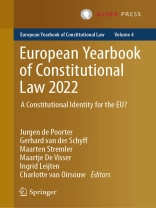The European Yearbook of Constitutional Law (EYCL) is an annual publication devoted to the study of constitutional law. It aims to provide a forum for in-depth analysis and discussion of new developments in the field, both in Europe and beyond.
This fourth volume of the EYCL addresses the underexplored and contentious topic of whether the EU possesses a constitutional identity of its own. To date, the main focus of scholarship and case law concerns the constitutional identities of the Member States of the EU. This is because the EU has to respect such identities according to article 4(2) TEU.
The attention for Member States’ constitutional identities stands in stark contrast to the notion of an EU constitutional identity. Such an identity features very little in the literature and debate on constitutional identity and the legal architecture of the EU. Consequently, this edition of the EYCL addresses the gap in legal research by studying constitutional identity with a focus on the EU itself.
The book explores various views on whether the EU possesses such an identity and what any possible identity might entail. In this way, a fuller and more inclusive picture can be formed of constitutional identity as it relates to the multilevel constitutional order inhabited by the EU and its Member States.
This volume will be of special interest to constitutional and legal scholars who are interested in EU and national constitutional law, as well as to political scientists. In addition, the book is relevant for judges, government officials, judges and policy-makers who work with EU (constitutional) law and its relationship with national (constitutional) law.
Jurgen de Poorter is State Councillor at the Dutch Council of State and professor at Tilburg Law School, Department of Public Law and Governance. Gerhard van der Schyff is associate professor at Tilburg Law School, Department of Public Lawand Governance. Maarten Stremler is assistant professor at Maastricht University, Faculty of Law, Department of Public Law. Maartje De Visser is associate professor at SMU School of Law, Singapore. Ingrid Leijten is professor at Tilburg Law School, Department of Public Law and Governance. Charlotte van Oirsouw is Ph D researcher at Utrecht University, Department of Constitutional and Administrative Law.
Inhaltsverzeichnis
Chapter 1. Introduction: Exploring the Concept of a Constitutional Identity for the European Union.- Chapter 2. Three Meanings of Constitutional Identity and their Prospects in the European Union.- Chapter 3. A Plaidoyer Against the Sisyphean Endeavour to Imagine the Constitutional Identity of the EU.- Chapter 4. Constitutional Identity of the EU as a Counterbalance for Unconstitutional Constitutional Identities of the Member States.- Chapter 5. Parameters of EU and Member State Constitutional Identity: A Topic in Development.- Chapter 6. St. Augustine and the ECJ on Citizenship.- Chapter 7. The Principle of Solidarity Forging the Constitutional Identity of the European Union.- Chapter 8. United in Diversity – Homogeneity and Differentiation as Parts of the Union’s Constitutional Identity.- Chapter 9. European Constitutional Identity as a Normative Concept: Pointing to the Core of European Democracies.- Chapter 10. From Monologues to Dialogue: the US “Certification” Procedure as a Source of Inspiration for EU Cooperative Judicial Federalism.












